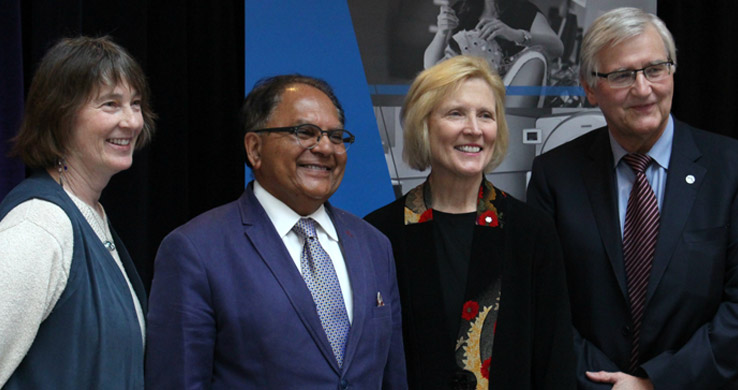Today, The Royal’s Institute of Mental Health Research (IMHR) and Carleton University announced a new partnership, the Culture and Gender Mental Health Research Chair, held by Dr. Kim Matheson.
“This joint research chair is all about partnerships. It’s born from a new partnership between the IMHR and Carleton University, and creating partnerships and networks between communities is at the very heart of Dr. Matheson’s work,” says Dr. Zul Merali, President and CEO of the IMHR.
The way we experience culture can be the source of both vulnerability and resilience. This is especially true for culturally marginalized groups within Canada. By working alongside experts at the IMHR, including experts in youth suicide prevention, Dr. Matheson’s position allows for new collaborations that will create real contributions to the issues facing culturally underserved communities.
Dr. Matheson has a long history of researching the social determinants of mental health, with a particular focus on health inequities. Some of her most recent work partners with First Nations organizations in the Nishnawbe Aski Nation region of northwestern Ontario.
Her largest ongoing project is the Indigenous Youth Futures Partnership, funded with $2.5 million over seven years by the Social Sciences and Humanities Research Council (SSHRC). This partnership is creating connections between research, promoting well-being, and First Nations communities. It works closely with Indigenous youth and community members to identify pathways forward.
Research coming from this partnership will help tell us what works, and why, to address concerns about the well-being of people in the region — especially youth.
Dr. Matheson is also working to develop an interdisciplinary team to help prevent suicide among First Nations youth — something which, in northwestern Ontario, is particularly affecting young girls.
Another ongoing project looks into the relationship between housing and mental health for marginalized populations, in hopes of informing public policy around the issue.
At the core of Dr. Matheson’s research are questions of identity — something that is neither singular nor static. Experiences of cultural identity can affect everything from access to mental health care, to what therapies are best, to what recovery looks like. They intersect with class, race, gender, and other ways we construct identity. To provide the best care, we need to understand these intersections.
“We don’t help anyone by going into a community and assuming we know what’s best. My work is chance to build new bridges, to listen and learn how we can actually help, and to harness community strengths and collective action to make change for disadvantaged groups,” says Dr. Matheson. Her work will also create new opportunities for rising Indigenous researchers to tap into the IMHR’s expertise and resources.
“It’s about building networks and partnerships. Luckily, I do that really well.”
Image
